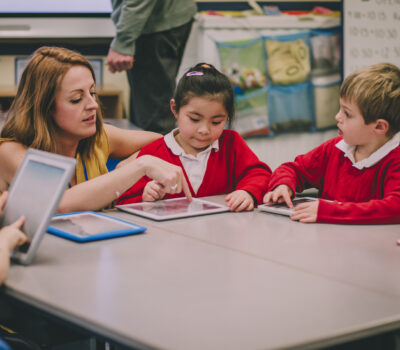


Our team sorts through all blog submissions to place them in the categories they fit the most - meaning it's never been simpler to gain advice and new knowledge for topics most important for you. This is why we have created this straight-forward guide to help you navigate our system.


And there you have it! Now your collection of blogs are catered to your chosen topics and are ready for you to explore. Plus, if you frequently return to the same categories you can bookmark your current URL and we will save your choices on return. Happy Reading!
The prospect of getting our pupils back to school can be exciting or daunting, or both.
Some of us have had periods of demotivation over that last year. The pandemic has brought about lots of changes, some for good and some for bad.
Cate Knight writes about how it’s OK to feel like this at points and some of the things that might have attributed to it.

I am sure I am not the only one who has struggled at times this year with motivation levels. I know that our learners certainly have!!
So what is motivation? How can we improve it? Should we try and artificially stimulate it?
Most motivation is something inherent within us. We respond to conditioning: Rather like Pavlov’s famous salivating canine.
Some of us are conditioned to respond to praise. We seek external gratification and validation and are therefore motivated to repeat actions that lead to us receiving this outcome. The majority of humans respond positively to external rewards BUT we can become complacent and even DEmotivated if that reward is easily achieved. There is then no requirement for us to “push” or work harder to receive the desired outcome.
Some of us respond to the school of tough love. Usually, this is because we have been taught by early childhood experiences to avoid repercussions or negative outcomes by improving performance. Fear can be a motivational weapon: yes, I say weapon because alongside fear comes cortisol and unwanted health implications.
Some are naturally competitive and this certainly ties in with the survival of the fittest theory to a large extent. The success of this motivational model relies on one very important factor though: are we competing against others? Or ourselves?
Invidious comparison can create a demotivational state of mind. When we see others “beat” us it can devalue our own successes.
Healthy self-competition is a great motivational strategy though and this is used by athletes the world over to make sure they are always performing at their very best.
So, why are we so demotivated this year?
There are so many reasons:
⁃ Future focus. It is hard to be motivated when the future feels uncertain. The impetus and importance of what we are working towards seems lacking.
⁃ Bigger picture. Sometimes life has other plans. It is difficult to remain focused on something when the world is in crisis around you. Sometimes previous “goals” seem smaller in comparison.
⁃ Routine changes. Being motivated by something requires you to care about the same things you always have. When our routine changes so does our mindset. It can be hard to refocus.
⁃ Meaning and purpose. During times of crisis and grief, we naturally question our existence. We question the fundamental respects of humanity. We ask “why?” And sometimes this can highlight the fact that we aren’t entirely certain what the reason for our goals or work is.
⁃ Pace. One of the greatest positives to come from COVID-19 is the slowing down of our hectic lifestyles. Not for everyone, but for many. This means that some are now finding it a struggle to work with the same urgency and pressure as before.
So what can we do?
I suppose it is a personal choice. We can recondition, reaffirm and reinforce. Or we can choose to think about why we have been demotivated and ask if it is a temporary thing or if something genuinely needs to change.
Either way, a lack of motivation is not a crime. It is normal, functional, and human and we should be forgiving of ourselves and others during this ongoing difficult time.
You must be logged in to post a comment.

The author

Read more

Read more

Read more

Read more

Read more

Read more

Read more

Read more


Are you looking for solutions? Let us help fund them! Nexus Education is a community of over 11,000 schools that come together to share best practise, ideas and CPD via online channels and free to attend events. Nexus also offers funding to all school groups in the UK via nexus-education.com


Established in 2011, One Education is a company at the heart of the education world, supporting over 600 schools and academies. Our unique appeal as a provider is in the breadth and synergy of the services we offer, supporting school leaders, teachers and support staff to achieve the best possible outcomes for their pupils and staff.

School Space is a social enterprise that has empowered schools for over 12 years through their profitable and hassle-free lettings services. So far, they’ve generated over £5 million in revenue for education, helping to connect over 200 schools with their local communities.


Unify is an online sales and marketing tool that allows users to create tailored personalised documents in moments.


There’s nothing special about the energy we sell. In fact, it’s exactly the same energy as all our competitors provide. But there is something special about the way we do it. Where others complicate the process, we simplify it. Where others confuse customers with hidden terms, we’re an open book. And where others do all they can to make as much money from their customers as possible, we do all we can to make as little. Everything we do, we do it differently. Our customers are a privilege. One we’ll never take advantage of.


Securus provide market-leading monitoring solutions to safeguard students on ALL devices both online and offline. We also offer a full monitoring service, where we carry out the monitoring on behalf of the school, freeing up valuable staff resources. From the smallest school to large MAT groups, Securus offers safeguarding protection for all!


Bodet Time offers dedicated solutions to education through lockdown alerts, class change systems, PA and synchronised clock systems. Improving time efficiency of the working and school day; ensuring safety through lockdown alerts; increasing communication with customised broadcast alerts.


Robotical makes Marty the Robot - a walking, dancing coding robot that makes programming fun and engaging for learners as young as 5. Our robots come with a full Learning Platform that has complete teaching resources, to make lesson planning a breeze.
A fantastic post Cate. Thank you for sharing. Shows how teaching is so much more than just printing off a highly structured lesson plan and presenting a ten minute slide show. The relations we establish with our students and children we work with is so important to help them develop the resilience as well as other skills essential for adulthood.